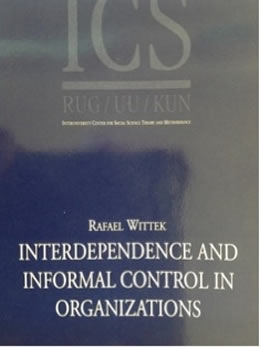Wittek, R. (1999). Interdependence and Informal Control in Organizations. Amsterdam: ThelaThesis.
Overview
Modern companies increasingly rely on teamwork, trust, and ‘flat’ organizational structures in order to improve their flexibility. The members of ‘self-organizing’ teams now often carry the responsibility of both resolving work-related conflicts and monitoring the performance of their peers. Peer pressure, as it emerges in such workgroups, is widely considered to be an extremely powerful instrument for securing high performance. However, organizations vary considerably in how their members deal with grievances caused by their colleagues. Temporary avoidance, gossiping, public insults, but also friendly peacemaking, informal mediation or toleration - all of these behaviors are part of the vast spectrum of how people in organizations react to the undesirable behavior of their peers. The purpose of this book is to find out more about why differences in sanctioning behavior exist and how they differ in their consequences. Drawing on an ethnographic study of informal control in the management team of a German paper factory and a longitudinal social network study in four Dutch organizations, this book develops and tests a theoretical framework about the interrelationship between (in)formal interdependence, control strategy choice, and the stability of cooperative relationships. This book will be of interest to students of organizational behavior and social scientists who are interested in the study of group processes, cooperation, and social networks.
Table of Contents
- Chapter 1 Introduction (1)
- Chapter 2 Existing Explanations and Empirical Evidence (17)
- Chapter 3 A Relational Signaling Theory of Informal Control (51)
- Chapter 4 Interdependence and Informal Control (69)
- Chapter 5 Social Goals and Informal Control (119)
- Chapter 6 Social Capital and Informal Control (155)
- Chapter 7 Cooperation and Informal Control (183)
- Chapter 8 Conclusion (209)
- Appendix (229)
- Dutch Summary (287)
- References (303)
- Index (331)
ISBN 90-367-1125-8
NUGI 684 652 653

